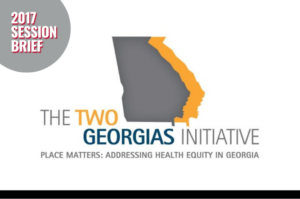By Talia Levine
 Four years ago, a series of hospital closings in rural Georgia highlighted a disturbing trend in the state’s healthcare landscape. As county health rankings continued to seat mostly rural counties in the bottom 10 slots, the disparities in access to and quality of health between urban and rural communities have become too obvious to ignore.
Four years ago, a series of hospital closings in rural Georgia highlighted a disturbing trend in the state’s healthcare landscape. As county health rankings continued to seat mostly rural counties in the bottom 10 slots, the disparities in access to and quality of health between urban and rural communities have become too obvious to ignore.
“This notion of ZIP code determines how long you live and how well you live in terms of health and health status is truly alive and well as it describes rural Georgia,” said Dr. Gary D. Nelson, president of the Healthcare Georgia Foundation, to a crowded auditorium at the State of the Public’s Health Conference in Athens, Georgia on October 17th. “ZIP code is becoming more of a factor than genetic code in describing the problems and the fate of rural Georgians,” he said.
It has been said that there are two Georgias in terms of economic vitality. Although originally offered in an economic context, the Healthcare Georgia Foundation recognized the applicability of this description to the health disparities between rural and urban residents of Georgia.
The foundation is dedicated to advancing the health of all Georgians and to expanding access to affordable, quality healthcare with an emphasis on underserved individuals and communities. The Two Georgias Initiative responded to the increasingly place-based inequities they noticed in health access and services.
“By that we mean the pursuit of creating conditions in which everyone has the opportunity to achieve their full potential through the elimination of disparities,” Nelson said.
The Two Georgias Initiative hopes to improve the lives of rural Georgians through partnerships with communities in need of support. The foundation awarded its first 11 Community Partnerships in June of this year. Among other criteria for selection, Nelson mentioned readiness and inclusion as two important qualities initiative-ready communities demonstrated.
Partner communities had to be willing to abandon traditional healthcare models and to explore new methods of delivering healthcare in their communities. These communities also understood the need for those most adversely affected residents to have a voice in an effective solution.
In the first year, grantees will focus on building partnerships in their communities, and creating a Community Health Improvement Plan (CHIP) and an Evaluation Plan. The second year will be devoted to implementation activities. Lisa Medellin, Senior Program Officer of Healthcare Georgia Foundation, noted that communities bring their own strengths to the program that will serve them well in this process.
“They are resilient communities. They have dedicated residents and engaged local leadership,” Medellin said. “Some of them have challenges—limited resources and fragile non-profit infrastructures—but they still do have a lot of assets.”
Grantees will also benefit from Healthcare Georgia Foundation’s partnerships with other organizations working towards bridging gaps in inequities. The Emory Prevention Research Center will provide capacity building to partnerships and assist with evaluation plans. Georgia Tech Health Analytics Group will translate data into formats more useable for important health decision-making.
Although the foundation has set up a scaffold for partner communities over the next two years, Nelson recognizes that health is an increasingly broad term, and that successful initiatives will recognize the myriad of factors that impact the health of a community’s residents.
“As the largest health foundation in the state, I don’t think anybody wants this foundation to stray from its health mission,” Nelson said. “Yet at the same time, we know we have to go upstream to truly move the needle on health outcomes, and to do so means we are going to have to figure out a way to address transportation, housing, poverty, jobs, you name it.”
The foundation knows that each community’s challenges will be different, and a technical assistance team is in place to assist them in identifying priorities. Central to the initiative is the tenet that each community must determine its own way forward. Although Nelson would love to see the program succeed and expand, he said the first step is for communities to decide what success means for them. Part of equity is returning control to the community.
“This is a movement moment as I like to describe it,” said Nelson. “This is about accelerating impact, it’s about delivering impact, it’s about measuring impact, and it’s about sustaining impact in rural Georgia, and we’re putting the control, the ownership, the flexibility and choice in the hands of rural Georgians to figure out how best to do that.”
